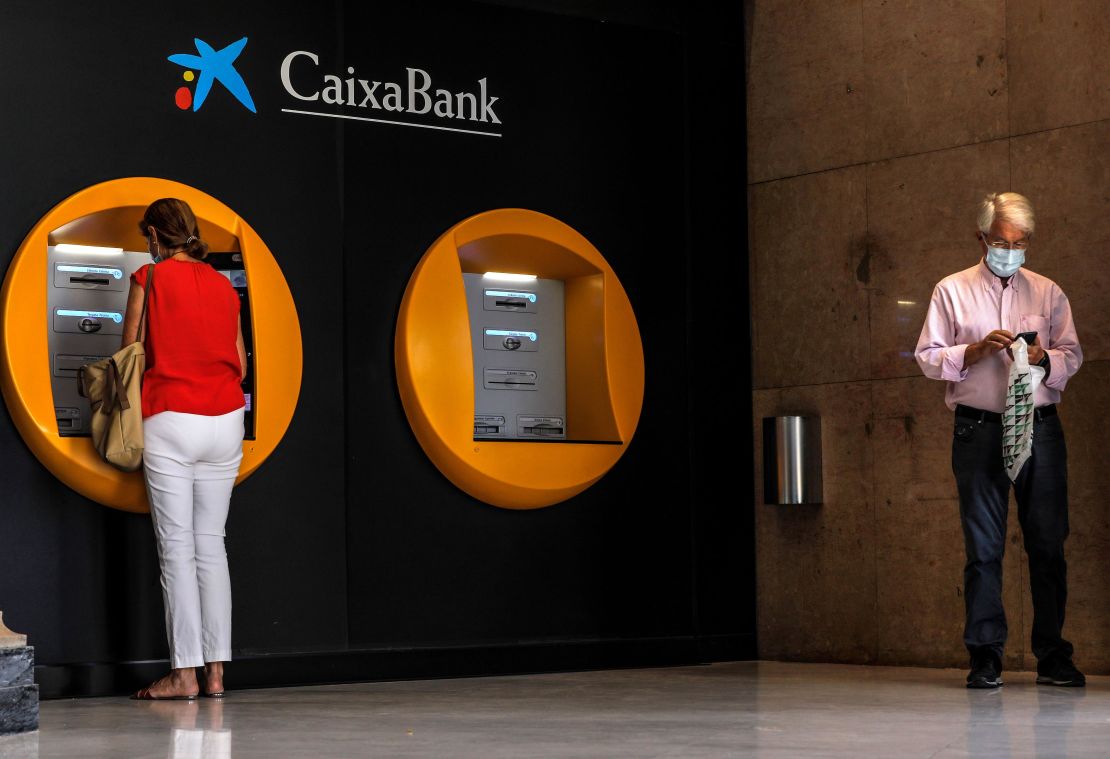Two big Spanish banks have announced a deal to create the country’s largest domestic lender in a move that could signal the start of further consolidation in Europe’s beleaguered banking sector.
CaixaBank (CAIXY) said in a statement on Friday that it will buy state-owned Bankia (BNKXF) in an all-share deal that will help the companies tackle falling profitability as a result of the coronavirus pandemic.
The deal values Bankia, which was bailed out by the government during Spain’s banking crisis in 2012, at €4.3 billion ($5.1 billion), according to Jefferies analysts.
The new entity will have 20 million customers and a quarter of all loans and deposits in Spain. Total assets will exceed €664 billion ($786.6 billion), making it the largest bank in the domestic market, the companies said. Santander (SC) and BBVA, which have extensive overseas operations, are Spain’s largest banks.
“We will become the leading Spanish bank at a time when it is more necessary than ever to create entities with a significant size,” José Ignacio Goirigolzarri, Bankia’s current chairman and the chairman of the new entity, said in a statement.
The companies said the merger made strategic sense against the backdrop of the pandemic along with other structural challenges faced by eurozone lenders, including the shift to digital banking and low interest rates.
Other deals could be on the horizon for Europe’s overcrowded financial sector. Swiss bank UBS (UBS) is reportedly examining a potential deal with rival Credit Suisse (CS). A merger of Deutsche Bank (DB), Germany’s largest lender, and crosstown competitor Commerzbank (CRZBF), was under consideration as recently as last year.

The deal in Spain comes amid a trying year for Europe’s banks, which have had to raise billions of dollars to cover bad debts as they brace for one of the worst global recessions on record. Banks are also contending with ultra-low interest rates, which make lending less profitable, prompting them to find other ways to support dwindling income.
“The clearest way to improve profitability is to gain the benefits of scale and extract synergies from a merger,” said Jefferies analyst Benjie Creelan-Sandford.
CaixaBank and Bankia expect the combined entity will benefit from cost savings of €770 million ($911.8 million) a year. They are targeting additional revenue of €290 million annually ($343 million).
Creelan-Sandford expects to see further consolidation among European banks, including in Spain and markets such as Germany and Italy, which are less concentrated.
In July the European Central Bank clarified its supervisory approach to consolidations, which was interpreted as being supportive of further tie-ups. “The regulator has become increasingly explicit that they would like to see more mergers and acquisitions in the sector,” Creelan-Sandford said.
But cross-border mergers are more complex and come with less low-hanging fruit when it comes to cost savings, such as being able to combine branch networks.
“There are multiple differences in regulations across countries [within Europe] and also in terms of products,” said Morningstar analyst Johann Scholtz. An even bigger hurdle is that there is no deposit insurance regime covering the European Union or the eurozone, he told CNN Business.
Where Scholtz does see opportunity, however, is among investment banks, which are less tied to particular countries and need scale to compete in an environment of thinning margins and undifferentiated products.
“European investment banks have found it very hard to compete against US rivals, even in Europe,” he said.
Earlier this week, the Financial Times reported UBS chairman Axel Weber had drawn up plans for a proposed tie-up with Credit Suisse to create a Swiss banking champion, although a later Reuters report said it was considered internally as unlikely, citing a person familiar with the matter. The companies told CNN Business that they do not comment on “rumors” or “speculation.”
While a merger between the two groups would likely add value to shareholders, it would face considerable regulatory hurdles in Switzerland pertaining to competition and rules that seek to prevent banks from becoming “too big to fail,” said Scholtz.
— Streisand Neto contributed reporting.




















